Question time for Education Minister Peter Weirpublished at 14:57 GMT 24 February 2020
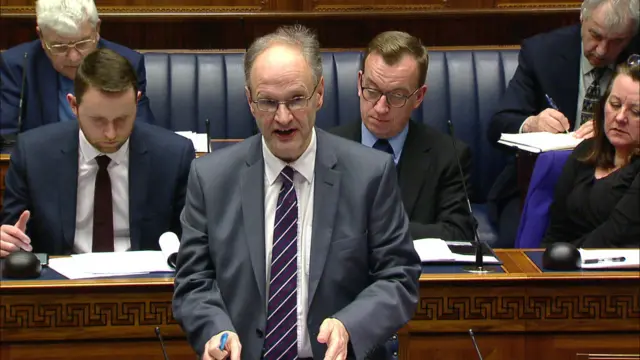 Image source, NI Assembly
Image source, NI AssemblyIt's the turn of Peter Weir - he'll answer questions about the work of his Department of Education.
MLAs debate Stormont finances ahead of introduction of Budget Bill
Question Time for Economy Minister Diane Dodds
Education Minister Peter Weir answers MLAs' questions
 Image source, NI Assembly
Image source, NI AssemblyIt's the turn of Peter Weir - he'll answer questions about the work of his Department of Education.
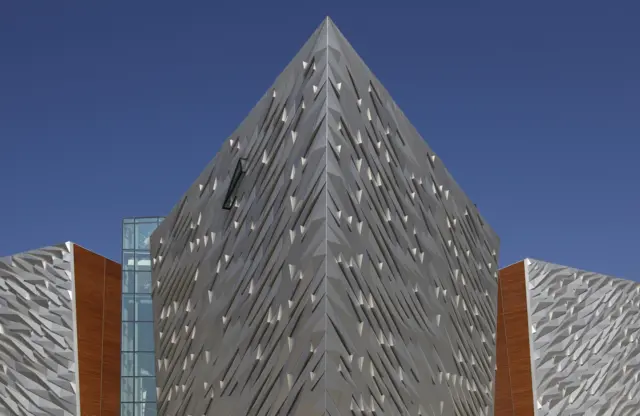 Image source, Reuters
Image source, ReutersNorthern Ireland turns 100 next year and DUP MLA Paula Bradley wants to know what the plans are for marking the milestone.
Economy Minister Diane Dodds says Northern Ireland will "celebrate a past century" as well as "looking forward to a future century of progress".
She tells MLAs the wants to use the centenary as a chance to market Northern Ireland on the "world stage", produce new tourism projects and "provide skills for our young people so that we can grow".
Colm Gildernew of Sinn Féin asks if the economy minister if she has set a timeframe for introducing the EU Work Life Balance Directive.
"No," is Diane Dodds' blunt reply.
Mr Gildernew asks the minister to consider implementing it in the light of the pressures faced by carers.
 Image source, Getty Images
Image source, Getty ImagesMrs Dodds says she herself was a carer, adding: "It is a difficult position for people to be in and often demands are 24/7."
She says the aim should be not just to have a compassionate system but a watertight system.
The SDLP's Mark H Durkan raises the issue of the "huge strength of feeling and opposition" to proposals for gold mining in the Sperrin mountains - he's concerned about the effects on tourism and agriculture.
Economy Minister Diane Dodds says she believes the Infrastructure Minister Nichola Mallon has received a planning application relating to that and it is up to her to make a decision.
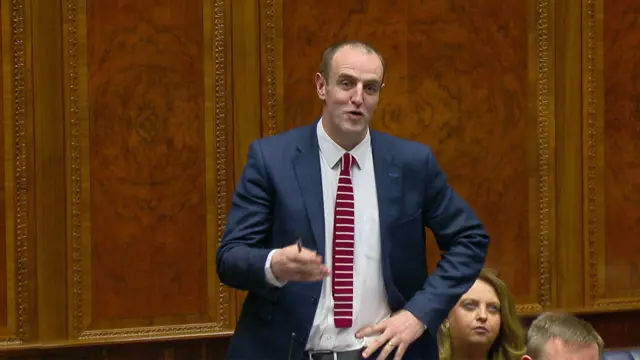 Image source, NI Assembly
Image source, NI AssemblyMrs Dodds says the subject of gold mining is a controversial one and it has the potential to affect communities, tourism and farming.
There is also a potential for job creation and these decisions should not be taken in isolation, she adds.
Green Party MLA Rachel Woods opens question time for Diane Dodds by asking the economy minister about trends in mineral prospecting in Northern Ireland.
Mrs Dodds runs through the 12 prospecting licences issued in Northern Ireland, including one for diamonds.
Ms Woods refers to "local community-based campaigns against the exploitation and pollution of countryside by international corporations" and says Northern Ireland has a major problem with unregulated mines and quarries.
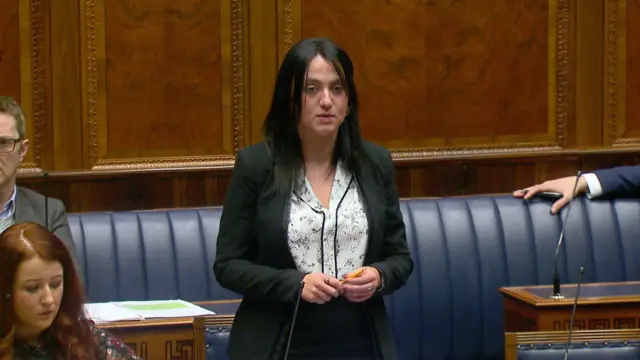 Image source, NI Assembly
Image source, NI AssemblySinn Féin's Emma Sheerin (above) asks the minister if she has any plans to stop the issue of licences for petroleum exploration.
The DUP minister says there are two applications for petroleum exploration licencing for areas south of Lough Neagh and south-west Fermanagh and a public consultation attracted 5,700 responses.
"Work is ongoing to identify and consider the complex issues and concerns that have been raised," she says.
Mrs Dodds says her department is conducting a review of petroleum exploration licensing.
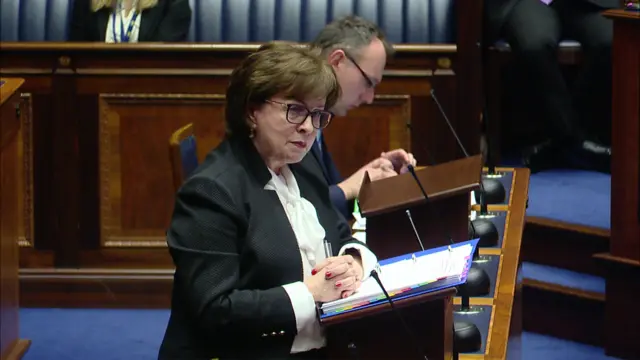 Image source, NI Assembly
Image source, NI AssemblyOn her feet at the ministerial lectern is Diane Dodds, who's taking questions from MLAs about her brief at the Department for the Economy.
News Letter political editor tweets...
Allow X content?
This article contains content provided by X. We ask for your permission before anything is loaded, as they may be using cookies and other technologies. You may want to read X’s cookie policy, external and privacy policy, external before accepting. To view this content choose ‘accept and continue’.
Ulster Unionist Mike Nesbitt points out that money has been spent in the past financial year on bodies that have been put on hold due to the Stormont deadlock.
"Over the past three years it wasn't just this chamber that wasn't sitting - there was no political meeting in terms of the North South Ministerial Council and yet it still cost nearly £1.5m in this financial year," he says.
"We simply cannot say that there was value for money in terms of that expenditure."
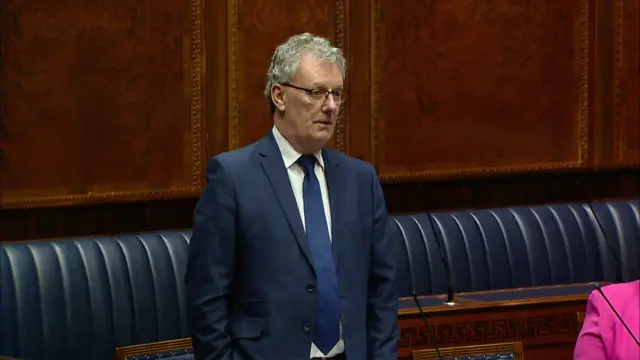 Image source, NI Assembly
Image source, NI AssemblyHe also takes aim at the Commission on Flags, Identify, Culture and Tradition - it's cost to date amounts to about £750,000.
Mr Nesbitt, a member of the Executive Office Committee, says members earn about £300 a day for "sitting on a body that has yet to report or make a single recommendation".
"Can we afford to go on with that?" he asks.
The Strangford MLA says Stormont needs to move away from its perceived "dependency culture" and instead switch to a "prosperity agenda", asking the Treasury for the "tools to strengthen our economy".
Public service reform will be the defining issue of the next decade in Northern Ireland, says DUP MLA Christoper Stalford.
"It is incumbent on all members to be the courage to do what needs to be done," he tells the assembly.
"There are going to be controversial and sometimes unpopular decisions to be made there."
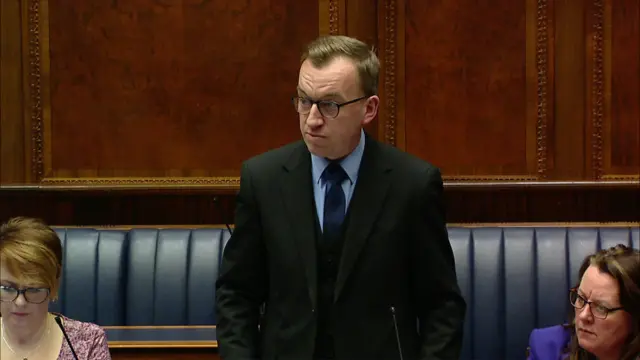 Image source, NI Assembly
Image source, NI AssemblyThe South Belfast representative says he's worried about the effects cuts in funding for urban regeneration, sport and employability and skills will have on people in his constituency.
"I know the need for investment," he says, "in those inner city communities."
The SDLP's Daniel McCrossan chairs the Audit Committee and he addresses matters connected to the Audit Office and the Northern Ireland Public Service Ombudsman (NIPSO).
The ombudsman also serves as Northern Ireland Local Governent Commissioner for Standards, who's charged with investigating alleged breaches of the local government code of conduct.
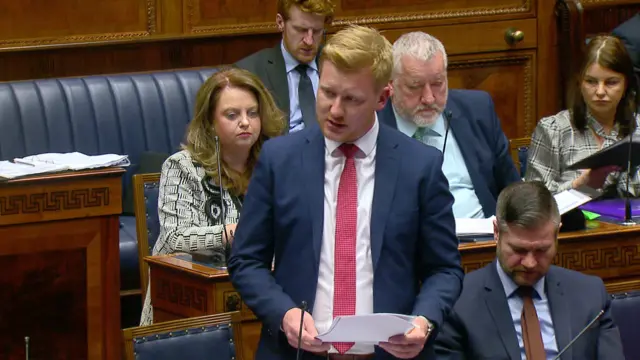 Image source, NI Assembly
Image source, NI AssemblyDue to a vacancy in the ombudsman's post since July 2019 there has been an enforced pause in the adjudication activity, says Mr McCrossan.
Mr McCrossan says he'd like to make some comments as the SDLP's education spokesperson and as MLA for West Tyrone.
He says public services are "falling apart to their knees and they are on life support in many areas".
Declan McAleer is the Agriculture Committee chair and he says members of that committee have been concerned about post-Brexit subsidies for Northern Ireland farmers.
Funding has been secured from the Treasury for this year to replace subsidies from the EU but Mr McAleer says there are "big questions" about how much Northern Ireland will get after that.
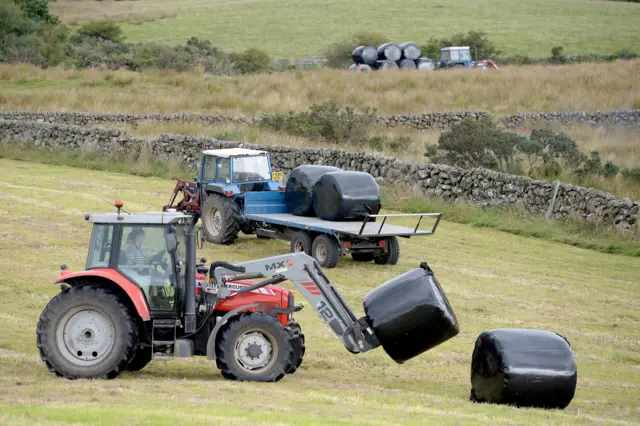 Image source, PA Media
Image source, PA MediaThe chair also says MLAs on the committee have been pressing the department about its staff requirement to deal with Brexit - Mr McAleer says officials said they believe 454 civil servants are needed to "deliver Brexit successfully".
The Sinn Féin MLA adds that the committee is encouraged that climate change features in the department's budget plans, with a bid having been made for £2m to take it more staff to deal with policy development on that issue.
Paula Bradley of the DUP presents the views of the Communities Committee.
It's a complicated position given the department's responsibility for social payments, much of which comes direct from Westminster in the form of annually managed expenditure.
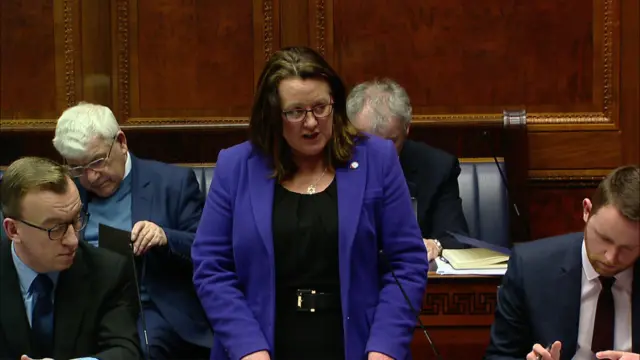 Image source, NI Assembly
Image source, NI AssemblyMs Bradley says the department surrendered £38.8m of DEL resource and £36.4m of DEL capital in the September 2019 and January 2020 monitoring rounds.
"The issue of departmental budgets has rarely been out of the news of late - everything seems to be a priority," she says.
"We all have a duty to ensure ongoing public service delivery but in doing so we collectively will have to make some unpopular decisions."
The Department for Education expects to overspend its budget by about £28m, says Alliance Party MLA Chris Lyttle chairs the Education Committee.
He says an "acute demand on our special educational needs provision" is one of the main reasons for that, with a 20% increase in numbers of children attending special schools over the past five years.
"The system is failing to adequately respond," says Mr Lyttle, and he adds that MLAs on the committee agree that responding to the "crisis" will require significant investment and radical reform.
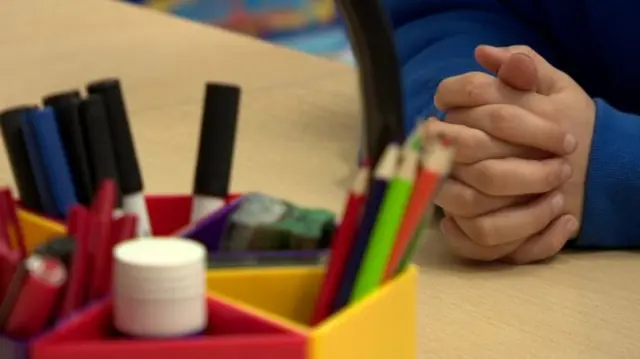
School budgets are in deficit, says the Education Committee chair, with between 80% to 90% of speeding going on staff salaries pushing some "stable and growing schools" into financial trouble.
"We have a system that is financial tipping point," he adds.
Among the other issues facing the education department are demands for an increase in teachers' pay and a potentially "significant" increase - possibly totalling £11m - in rates bills for many schools.
"Add to that investment needed for childcare, nurture, tackling underachievement, emotional health and wellbeing - those costs are projected to be £50m or £60m."
Executive Office Committee chair Colin McGrath is next up and says the redress scheme for victims of historical institutional abuse "will have a sizable long-term financial impact", with the exact costs being hard to predict.
The department says it could be "between £25m and £60m for the 2020-21 period", adds the SDLP MLA.
Mr McGrath says the committee believes that the funding should come from the Northern Ireland block grant and "robust efforts" should be made to secure funds from the institutions that were involved in the abuse.
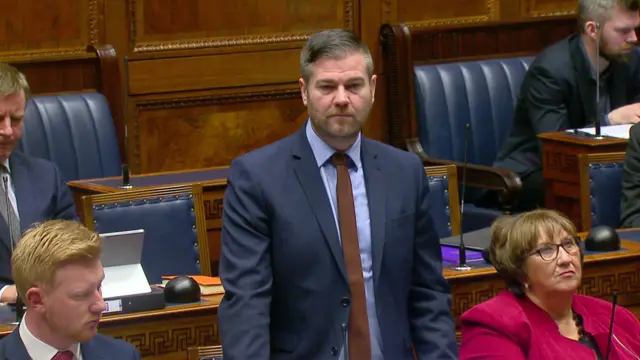 Image source, NI Assembly
Image source, NI AssemblyTurning to the question of payments for people badly injured during the Troubles, Mr McGrath says the department has estimated costs of £25m to £60m for the coming year and £109m over the next three years.
He says committee members believed those estimates should be treated as conservative and there was no question that the costs should come from the Northern Ireland block grant.
"Westminster designed the scheme, Westminster put it into law, so Westminster should foot the bill," he adds.
Health Committee chair Colm Gildernew tells the assembly the budget for health services will exceed 50% of the entire Northern Ireland block grant.
The Sinn Féin MLA says this demonstrates a "welcome response to need" but underlines the "urgent need for radical reform" of the health service.
He says the Health Committee in the previous assembly mandate was told that without investment hospital waiting lists would rise and GP practices would close.
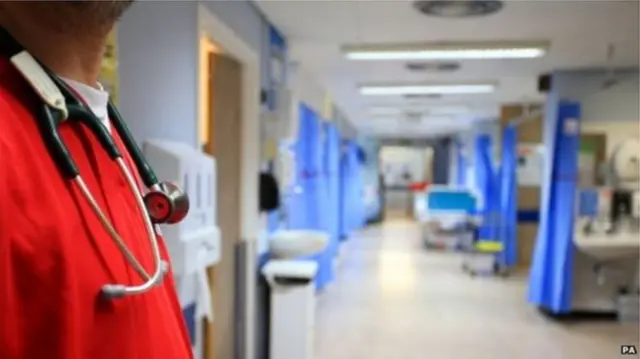 Image source, PA Media
Image source, PA MediaThose fears, says Mr Gildernew, have turned into reality "despite £100m invested in transformation in each of the last two years".
He also points out that the spend on locum and agency staff in the year until April 2019 was just over £200m.
Mr Gildernew says the cost of temporary staff has more than trebled since 2014-15 and that money could be better used with "workforce planning, recruitment and retention issues can be effectively addressed".
Michelle McIlveen - the DUP MLA who chairs the Infrastructure Committee - says the budget for the Department for Infrastructure is one of the largest across the executive.
"It is evidently a department that has reached breaking point after years of under funding," Ms McIlveen says, explaining there's also been a trend in recent years to ignore the deficit of the public transport provider Translink.
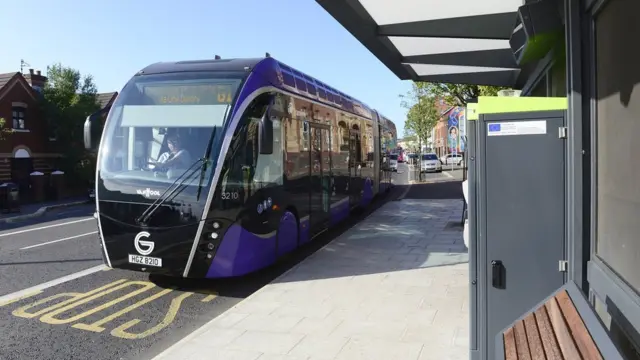 Image source, Pacemaker
Image source, PacemakerMs McIlveen says the department has "recurring structural deficit of £61m going into the next financial year, due to rise to £80m in 2021-22 and £90m in 2022-23".
She outlines some of the pressures on Northern Ireland's infrastructure, including a requirement for £1.45bn for NI Water, which provides water and sewerage services.
Ms McIlveen adds that the "very real prospect" that Translink "could become insolvent" would be "catastrophic for the transport infrastructure of Northern Ireland".
Ulster Unionist leader Steve Aiken is chair of the assembly's Finance Committee and he gets the first reply.
He says the committee took evidence from officials on the matters the MLAs are dealing with today.
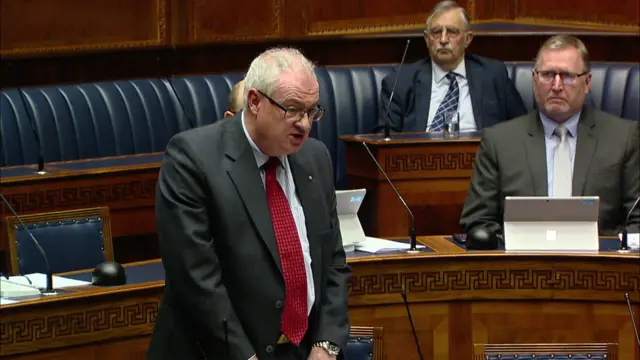 Image source, NI Assembly
Image source, NI Assembly"I have no doubt that over the remainder of this mandate we will be faced with many challenges necessitating focused financial scrutiny," says Mr Aiken.
The committee supports the motions, he says, and has approved accelerated passage of the Budget Bill.
Finance Minister Conor Murphy tells the assembly that some last-minute spending decisions made by Whitehall departments meant Stormont departments received an extra £18m for this financial year.
He also outlines the outcome of the January monitoring round - basically a reallocation of unspent funds acoss the executive departments.
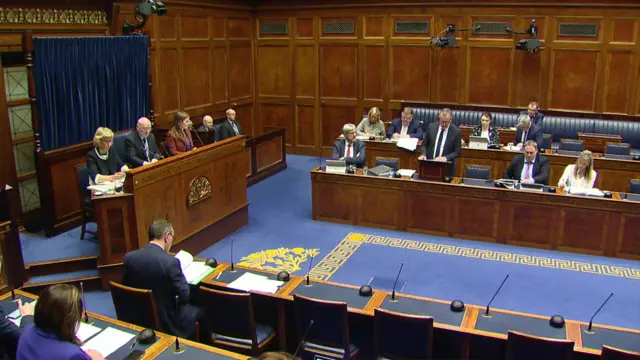 Image source, NI Assembly
Image source, NI AssemblyThe monitoring round resulted in a £10m boost for the special educational needs sector, as well as £1m being set aside for people affected by the contaminated blood scandal.
Mr Murphy also explains that the second motion up for debate - the vote on account - will provide an initial allocation for the new financial year that will provide an initial allocation of funding to department until the main estimates are presented to the assembly for approval in June.
He says the 2020-21 budget will be something the executive will be working on in the coming weeks.
 Image source, Getty Images
Image source, Getty ImagesFinance Minister Conor Murphy introduces his second motion too, meaning the both motions will be rolling into one big debate.
The second motion is:
Quote MessageThat this Assembly approves that a sum, not exceeding £7,962,895,000, be granted out of the Consolidated Fund, for or towards defraying the charges for the Northern Ireland Departments, the Food Standards Agency, the Northern Ireland Assembly Commission, the Northern Ireland Audit Office, the Northern Ireland Authority for Utility Regulation, the Northern Ireland Public Services Ombudsman, and the Public Prosecution Service for Northern Ireland for the year ending 31 March 2021 and that resources, not exceeding £9,054,440,000, be authorised for use by the Northern Ireland Departments, the Food Standards Agency, the Northern Ireland Assembly Commission, the Northern Ireland Audit Office, the Northern Ireland Authority for Utility Regulation, the Northern Ireland Public Services Ombudsman, and the Public Prosecution Service for Northern Ireland for the year ending 31 March 2021 as summarised for each Department or other public body in Columns 4 and 6 of Table 1 in the Northern Ireland Estimates Vote on Account 2020-2021 that was laid before the Assembly on 19 February 2020.
Motion: Supply Resolution for the 2020-2021 Vote on Account
That forms part of the Budget Bill, which will be introcued at the end of play today and will be up for debate tomorrow.
The motion allows for departments to draw down 45% of their budget from the 2019-20 financial year to spend in the first few months of the new financial year, beginning in April.
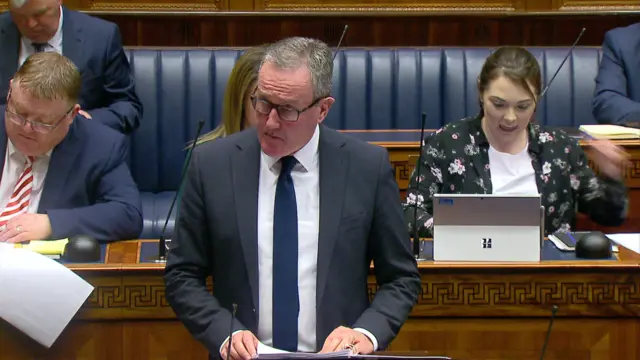 Image source, NI Assembly
Image source, NI AssemblyIt's the start of the main business now, introduced by Finance Minister Conor Murphy - two motions relating to Stormont's finances.
The first of which is below:
Quote MessageThat this Assembly approves that a sum, not exceeding £17,519,166,000, be granted out of the Consolidated Fund, for or towards defraying the charges for the Northern Ireland Departments, the Food Standards Agency, the Northern Ireland Assembly Commission, the Northern Ireland Audit Office, the Northern Ireland Authority for Utility Regulation, the Northern Ireland Public Services Ombudsman, and the Public Prosecution Service for Northern Ireland for the year ending 31 March 2020 and that resources, not exceeding £21,022,321,000, be authorised for use by the Northern Ireland Departments, the Food Standards Agency, the Northern Ireland Assembly Commission, the Northern Ireland Audit Office, the Northern Ireland Authority for Utility Regulation, the Northern Ireland Public Services Ombudsman, and the Public Prosecution Service for Northern Ireland for the year ending 31 March 2020 as summarised for each Department or other public body in Columns 2 (c) and 3 (c) of Table 1 in the volume of the Northern Ireland Spring Supplementary Estimates 2019-2020 that was laid before the Assembly on 19 February 2020.
Motion: Supply Resolution for the 2019-2020 Spring Supplementary Estimates
The purpose of that is for the assembly to give its retrospective approval of all the movement of funds between departments that have occurred due to monitoring round adjustments.
The adjustments mean the agreed spending limits for departments have changed, either going up or down, which is why MLAs must give their permission.